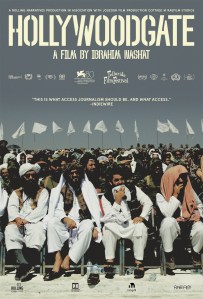EXCLUSIVE: In war, it is said, to the victor go the spoils.
In the case of Afghanistan, the Taliban proved victorious, retaking power after 20 years of American military occupation. And the spoils have been handsome, as illustrated in the new documentary Hollywoodgate: billions of dollars worth of sophisticated weapons abandoned by departing U.S. forces.
“The Americans left us an enormous treasure,” comments one member of the Taliban, in the trailer for the film, as he surveys the booty. Watch it above.
Egyptian-born director Ibrahim Nash’at spent a year documenting the Taliban’s consolidation of power after the U.S. withdrawal from Afghanistan in August 2021. “Risking his life in the war-torn nation, Nash’at is on the ground with the Taliban when they enter an American base loaded with a portion of the roughly $7 billion worth of U.S. armaments left behind,” notes a synopsis. “Driving towards an astonishing and chilling end, Nash’at tracks Taliban leaders as they attempt to transform from a fundamentalist militia into a modern military regime, employing Hollywood-style propaganda to achieve their goals.”
Rolling Narratives
Fourth Act Film will release the film theatrically in New York on July 19 and in Los Angeles on July 26, followed by an expansion to other cities. In the U.K., Curzon releases the film on August 16. Hollywoodgate (the title refers to one of the access points to a CIA installation outside Kabul where loads of equipment were left behind) has earned numerous awards, including the Grand Jury Award at the Full Frame Documentary Film Festival in Durham, NC, Best Documentary at the Adelaide Film Festival in Australia, two awards at the El Gouna Film Festival in Egypt, and a top award from the Zurich Film Festival, among other honors. The documentary premiered at the Venice Film Festival last year and made its North American premiere at the Telluride Film Festival.
The Taliban fighters who invited Nash’at to record their takeover of the CIA base thought he was shooting material that would show them in a heroic light. “With Ibrahim, they were sure that what he was filming fit exactly their own propaganda [purposes],” producer Talal Derki told Deadline. “They don’t know the structure of making documentary, where the focus can go, and how the filmmaker can build his film at the end of the day. So, of course, they missed that.”
By the same token, the Taliban always looked on Nash’at with a degree of suspicion. “You can read the eyes, and the eyes were never fully trusting,” the director said in an interview with Deadline at Telluride. Filming brought daily anxiety, he said. “Fear was always there and you try, every morning, to hide the fear.”
Nash’at, a native Arabic speaker, spoke a different language from his Taliban subjects (who spoke Pashto or another non-Arabic tongue). It wasn’t until well after filming ended, when a translation was completed, that Nash’at realized a Taliban commander had threatened to have him shot. “We discovered it in the editing process when the translation was happening,” he said, “and it was shocking.”
Hollywoodgate is a Rolling Narratives production, in association with Jourzour Film Production, Cottage M, and RaeFilm Studios. Producers are Derki — the Oscar-nominated director of Of Fathers and Sons – and Oscar winners Odessa Rae and Shane Boris (Navalny). The director of photography is Ibrahim Nash’at. Atanas Georgiev (Honeyland) and Marion Tuor edited the film; music is by Volker Bertelmann. Executive producers include Mehmet Elbanna, Sahraa Karimi, Diane Becker (Navalny), Katherine Embiricos, Jim and Susan Swartz, and Melony and Adam Lewis. Co-executive producers are Geralyn White Dreyfous, Poppy Jaimie, Heba Khaled, Steven Cohen, Paula Froehle, and Hussain Currimbhoy.
In the film, the emboldened Taliban, now securely back in power, are shown being courted by emissaries from China, Russia, and other countries. And in one disturbing scene, Taliban leaders threaten to invade neighboring Tajikistan; military aircraft left by the U.S. makes the regime a more formidable threat.
The U.S. spent an estimated $2.3 trillion to fight in Afghanistan, in what became known as a “forever war.” Almost 2,500 U.S. military personnel were killed there. The legacy of U.S. involvement in Afghanistan is among the vital questions raised by Hollywoodgate.

Director Ibrahim Nash’at (L) and producer Talal Derki at the Telluride Film Festival.
Matthew Carey
“The film is made with the purpose of trying to make the world understand what’s going on in Afghanistan and make them understand the effect of the ‘forever war’ mentality that was there for 20 years,” Nash’at told Deadline. “It was made upon promises of ending terrorism and saving the people of Afghanistan and none of these things, none of these promises were met and actually the opposite — those guys [the Taliban] now have way more weapons. And the mentality of the forever war has led to where we are now, and we need to question the foreign policy — the idea of using weapons to solve problems.”
Watch the trailer for Hollywoodgate above.

